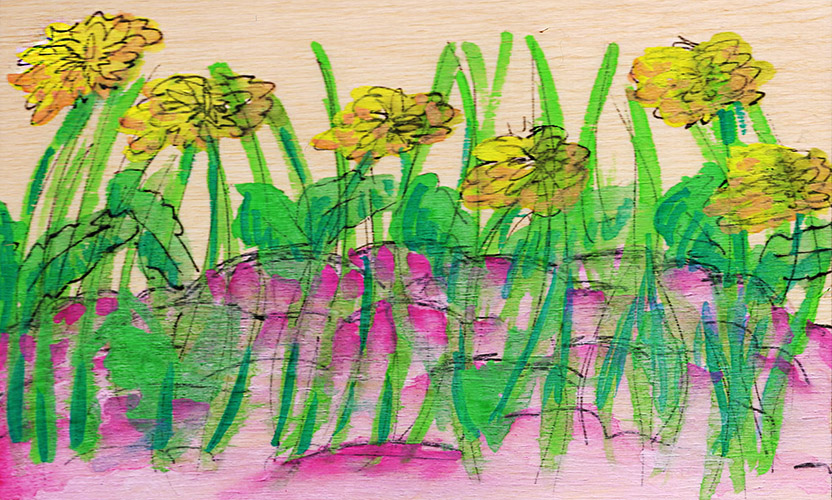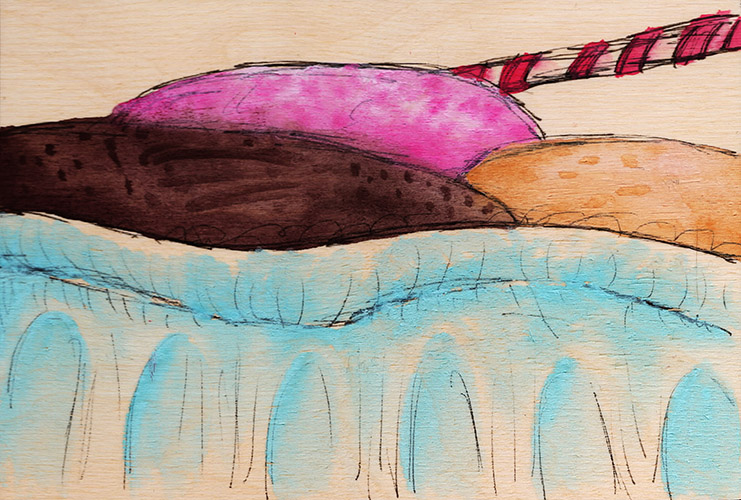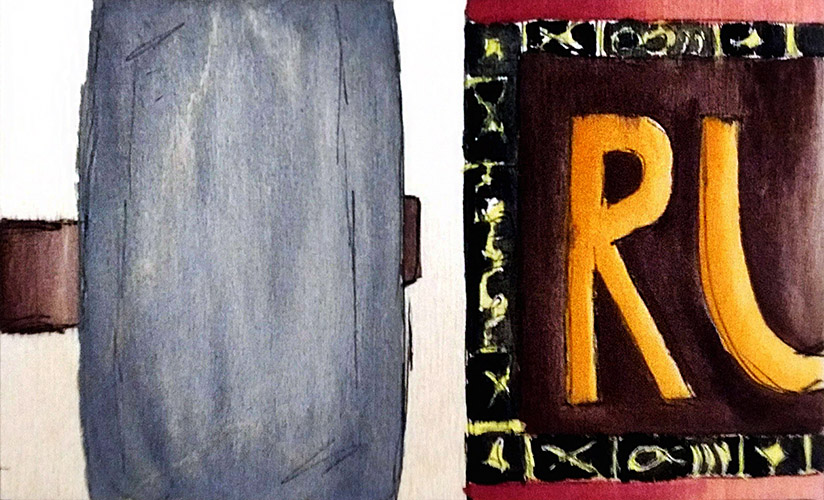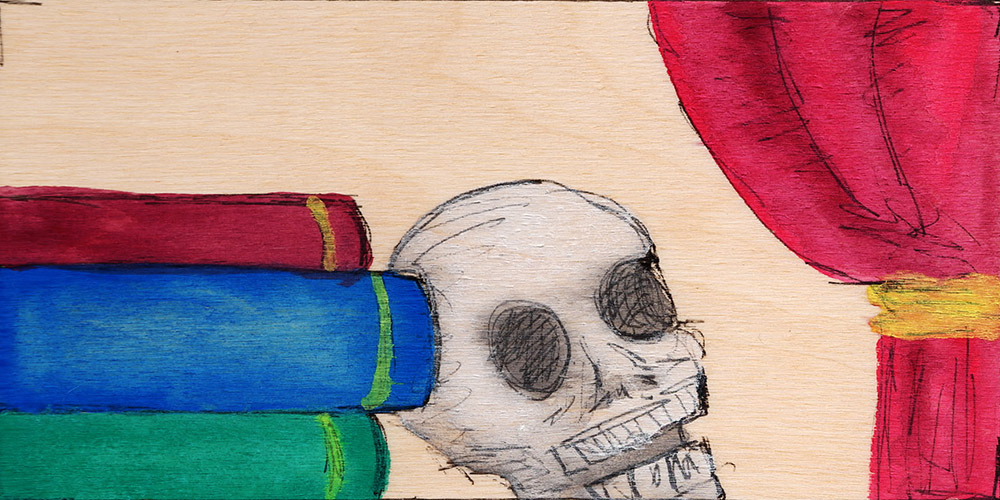As part of the course work for an MFA in creative writing, I was enrolled in a workshop in which we were writing sonnets, sestinas, villanelles, haikus, and other poetic forms. Memorizing a Shakespearean sonnet was suggested as an assignment. I figured my aging brain could use the exercise, so I took on a two-week challenge of committing “Sonnet 23” to memory. Here is the object of my brain function challenge.
Since the sonnet has only 14 lines, I thought the challenge would be a breeze, but I soon found that committing the adventurous language to my ever-wandering, clack-dish, and distracted brain was no easy task. I recited the poem in the shower, as I walked the dog, on my daily wait on subway platforms, and in other idle moments. These days, with the proliferation of cell phones, I see and hear people speaking out loud with full abandon to the object of their dismay or love. Although I do find this at times a disturbance in my city bliss, I took memorizing the sonnet as an opportunity to be like everyone else, and even to be outrageous. With all the quiet exuberance I could muster and flagrant, silent overacting, I recited the poem out in the world. Memorizing the sonnet was a physical and mental challenge, and I often wished for a coxswain’s repetitive chant, Memorize! Memorize! Memorize! During my two-week stint, only once did someone respond to my murmurings.
I had given my seat on the downtown Line 6 train to a woman of a certain age, and while I was mumbling, “O let my books be then the eloquence,” she looked up at me, with love for a straphanging good Samaritan, and then followed right on cue with “And dumb presagers of my speaking breast.” She thumped her hand to her chest as we finished reciting the sonnet together. No one in the car looked up from multiple Candy Crush and Sudoku games on their phones.
The subway sonnet angel and I high-fived and hugged as I exited at Astor Place. She whispered in my ear, “Godspeed. I had to memorize sonnets in school back in the ’30s. I didn’t think anyone still did that. Thank you for the sonnet and the seat.”
As I walked up the steps to the street, avoiding an urge to go into Kmart to check out the winter hat display, it occurred to me that this woman’s memory was still fluid, and perhaps the memorizing had something to do with her very agile brain.
I also listened to Ian McKellen reciting the sonnet on my iPhone as I went jogging. Each word dripped like honey in descending decibels in his rounded and rolling vocalization. My running pace slowed as he spoke, and my tired-from-jogging legs went rubbery with awe.
The twists and turns, the irony in understanding English in such a form, was a challenge. Every line felt slippery, and the lines that followed seemed to slide right out from under me. My brain ran through what it had taken in, but often it was hard to remember what came next. Repeat. Repeat. Repeat to make it stick. The sonnet as a high bar of literary craft gave me a kick in my writing pants. Could I fashion sentences that would be more surprising and have unexpected turns? When I finally recited the 14 lines without referring to my cheat sheet, I was proud and humbled to have this flowering of language growing amongst the weeds crowding my brain cells. And then, having one sonnet under my belt made me hungry for more. I hoped a by-product of all this work would be a fusion of inspiration for my writing with a good dose of exercise for my maturing brain.

During this memory boot camp, I was also writing the first draft of my second novel. In the process, I was experiencing writer’s anxiety regarding the sophomore venture. When I ran into a cul-de-sac of story or was stalled in a traffic circle of thoughts that kept me from moving forward, the sonnets’ themes of erotic love, procreation, aging, and human frailty encouraged me to break away and take chances. Shakespeare became my coach, yelling from the sidelines, getting me to test unexplored directions and possibilities in syntax and word choice. Parry forward! Kill it, you playful wench! Challenge the churlish! Let’s see what this salubrious bitch can do! he seemed to be telling me.
I kept the worn-out napkins and Post-its on which I had scrolled the sonnets tacked above my writing desk. Memorizing became less and less stilted as I worked through and cracked the code of the puzzle of words that flowed inward and outward with uncanny depth, risk-taking, and humor. Revealed in the poetry were those unreachable, difficult to articulate, crucial, and awkward life moments. The sonnets are a mirror for the things we feel but can’t see or put into words. What follows are some thoughts about the sonnets and how they changed my outlook on life and writing.
When I recited the lines of Sonnet 23 in the workshop for the first time, my voice trembled; my brain and mouth searched for the words. I asked someone to hold the two-by-two cheat sheet I carried around to prompt me when I called out, “Line, please.” I was sweating and slightly undone, eyes tearing by the end. Reciting in front of an audience was very different from the privacy of the shower and loneliness while waiting for the G train. My goal was to make the lines as familiar and snug as a favorite piece of clothing. I tried several methods to imprint the words on my brain. For this sonnet, I went with the idea that a well-worn piece of clothing is a comfort and donned a pair of cream-colored silk opera gloves while penning and reciting the sonnet over and over. The gloves gave a flourish to the act of memorizing and became a physical reminder of the intricate lines of poetry regarding unsure love. I have also been known to wear a knit hat made from a crocheted tissue box cover (ridiculous), or a necklace of Cracker Jack prizes to signal my husband, with whom I share a one-bedroom apartment, that I am writing (or memorizing) and would rather not be disturbed unless disaster struck, or the dog did something particularly adorable. The elegant gloves were an amusing shield or borderline goddess attire, and there was rarely an interruption except when Sebastian, the dog, showing no concern for my creative endeavors, needed a walk or was holding a ball in his maw for playtime. Those dark eyes of desire are irresistible. I wondered if any of the sonnets addressed deep love for a pet canine, and if not, perhaps I would write one.
In Sonnet 23, the poet writes of the dependence on written words as an honest way to communicate feelings when nerves turn to fear in attempts to express love for another. To be human is to be nervous, frail, shy, dissolute, and easily disconcerted in face-to-face contact with a desired object or sentient being. To be unperfect! I could not stop saying that word. How wonderful it was to discover. In its awkwardness there was perfection. This word embodied the struggle to describe the depths of feeling, and I was reminded of my own teenage, angst-ridden moments of unrequited crushes.
Should I have I scrawled on a napkin, I think you’re cute when you do that, and passed it across a diner booth to express my love rather than barely whispering it out loud? Back in junior high in 1973, Charlie S. slurped the last of the malted we shared at Friendly’s. He did not hear my compliment of admiration as he sucked and slurped to the bottom rather loudly. He smiled, satisfied at his accomplishment since it was his second malted in less than a half-hour. We never went to Friendly’s together again. Reminded of this humiliating incident, I filed it away and will perhaps someday have a character in a story whisper, but then to decide to write a message on a napkin and pass it across a booth over deliquescing scoops of ice cream. Maybe even risking something poetic: Is that cupid in your cheeks, so pink and puffed, wanna go out with me?

Considering my present rate of retention, memorizing all 154 sonnets may be difficult to achieve before leaving this planetary plane. My advice to anyone in the second or third decade of life — Start now! The sonnets are wonders of poetic agility and terrific companions.
As I have trod more than 60 years on the planet, I do my best to keep up with healthful practices such as yoga, running, swimming, açai smoothies, yearly gynecological exams, calcium and magnesium (in reasonable quantities), colonoscopies, and peering into a mirror with ten times magnification to catch wiry chin hairs before they go feral. I also have tried to minimize my clicks across the cyber stream and instead go to a sonnet to see if the brain stimulation helps my querying mind. I may not find the answer to what year the Yankees first won the pennant, but maybe something more practical, like a metaphor or simile for being at a loss for words, will help me through a sticky moment. (The Yankees won the pennant in 1921. I happen to know this because it was the year my mother was born. My Bronxite grandfather was a fanatical fan. To have his first child born and the pennant won all in one year fed his zeal even further.)
Each day spent working through a sonnet introduced me to an alluring simplicity in word choice that kept me tilting my head in wonder at how stunning our English language can be. I went back to the beginning and began memorizing Sonnet 1. The shrewd sonnets were tricksters of syntax and rhyme. Memorized lines began leaping from one sonnet to another. Sonnet 1 barged into Sonnet 23 like a flamboyant party crasher. I hoped this playful and subversive word usage would influence my writing as well.
An anecdote from the world of golf that I came across in Peter Mendelsund’s wonderful book What We See When We Read inspired me to keep going:
Jerry Barber, a professional golfer, got a shot right out of a sandlot.
A person watching said, “Gee, you sure are a lucky trap shot player.”
“Yes, I know,” Jerry replied. “And the harder I practice, the luckier I get.”
Coach Shakespeare was meting out tough love through the alternatingly infuriating and nurturing sonnets. There a brooding facade, then screaming from the sidelines: Keep at it you clack-brained, brandy-misted booby!
After having leaped around the sonnets to choose another to memorize, I came stumbling back to the beginning and chose Sonnet 1 for no other reason than that it was the first. The novel I am writing, the story of a young woman coming of age in the East Village in the 1980s, is a work of autofiction, so I have been particularly attentive to anything that might guide me through transforming life into fiction. Many of the themes in the sonnets, such as the complexities of love, identity, and aging, are themes I have been writing about in the novel (Working title: Sledgehammers and Rum: A Girl’s Guide to Urban Homesteading).

In this sonnet, the poet addresses the themes of youthful narcissism and obsessive vanity. After several readings, I was taken with the phrase “beauty’s rose,” and how the abstract noun is given a concrete marker. I began thinking of other possible phrases: cruelty’s bristle, malice’s Frigidaire, longing’s undergarment, disappointment’s mule. I was just getting started.
Memorizing is an act of will and of the imagination. I felt my brain shifting as if it was physically creating a place to gather the lines into a disorganized sock drawer. The jumble of lines in my brain, like mismatched socks, gave me insight into associative tricks the mind can play. Finding ways to keep the lines intact was amusing, and satisfying like an orderly drawer, and it also felt daring and artful.
While reciting this sonnet I kept getting stumped by the line “Thyself thy foe, to thy sweet self too cruel.” The line points a finger at the person the poet is admonishing — “making a famine.” This is harsh criticism, tough love perhaps, and in it, I felt the smarmy tentacles of self-loathing. Was I avoiding the line and its implications in my life? Or was I trying to be positive and move toward the “herald” of spring renewal, to be open and acknowledge the abundance of beauty in my life? There was also the confrontation regarding procreation to contend with. Perhaps the poet was not only speaking about having children — not all of us are blessed with heirs — but that we have the ability to conjure words and love for even the most mundane object. The sentences I was working through every day in the novel were a nest of screeching baby birds in need of nurturing. From this sonnet, I made a pact to allow my stories to take chances, have room to grow, and take flight from the protective confines of the page.
Emotions and physical reactions are illuminated in the sonnets, yet the mystery of experience and the wonder of the unknown are retained. Shakespeare’s sonnets unearth infinite ways language can give rise to comfort, humor, and insight, and unmask the perplexities of life.
I made several attempts at writing sonnets while engaged in the process of being sonnetized. I wasn’t unpleased, but the exercise held me true to the rhythm of the form. Many poets have played with the form with much greater success (check out e.e. cummings’ pity this busy monster, mankind), but the one I tried to touch upon the subject I found missing in the canon, as mentioned previously; the wonder of a having the companionship of a dog. This one dedicated to all those I have known, but in particular to my present love, Sebastian.
Love for Canine
Shaggy dear, rheumy eyes yearning for mine
Tapping into my latent peasant-ess
My Sebastian, you of all things Canine
Words are growlings of each moment’s essence.
Our silent repose in Pieta
Submissive, sentient fur in my cupped arms,
Paws of four surrendered to Shangrila
Heart’s heat goes skyward with your tail lick charms.
Guru or Lover, waggling between both
Blind always to my human faults galore
I’ll fight for you, a fanged, fierce Rehoboth
Yearning for your adoring howling roar.
Raise a paw to you, Dean of Awareness,
PhD in procuring food’s delight,
Snuffling souls’ butts with High Cognizance,
Never say no to affect more respite.
Your button black nose wet as Fury’s tears
Thawing the thick walls of all hearts for years.
The sonnets, in my experience, have been a mental and physical road map. There were times when memorizing them that I felt lost trying to decipher the meanings. I experienced anxiety, embarrassment, and frustration, and then the thrill that comes with finding a way out of the abyss and confusion of unfamiliar territory. The lyrical text had me imagining the words, like dancers and athletes in heightened physical and mental state, about to make new and unexpected moves. Like the golfer’s practice that brings the luck to get unstuck from a sand trap, the sonnets, unrestrained by flesh and bone, were free to roam around my brain. The journey of memorizing became a way to take the insides and turn them to the outside. I hope with this in mind to find infinite ways to bring emotion and unexpected moments to my stories. The sonnets interpret and unravel experiences that connect us all.
The studying and embracing of these sonnets have inspired me to be playful with words, to take risks with order and choice. I felt the burn as I plowed through, maybe even restored some brain cells or formed new muscles to knock sentences out of the sand traps in my mind with some lucky word choices hitting the page. To keep taking chances, to smell the blood and guts of a word and let it seep into the next, to be free of constraint even in the strict rhyme scheme of ABAB CDCD EFEF GG. •




